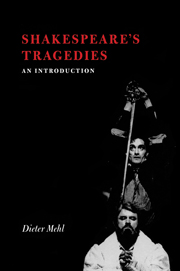Summary
HAMLET
LIKE THE TWO EARLY TRAGEDIES, THE TRAGICALL HISTORIE OF Hamlet, Prince of Denmarke ends with a glance back at the events we have just witnessed and with the express wish to make intelligible to the survivors the magnitude of the tragedy and to do justice to the memory of the dead. Hamlet himself prevents Horatio from following him into silence and asks him to protect his reputation by a faithful report of what he alone knows:
O God, Horatio, what a wounded name,
Things standing thus unknown, shall I leave behind me.
If thou didst ever hold me in thy heart,
Absent thee from felicity awhile,
And in this harsh world draw thy breath in pain
To tell my story.
(v.1.349–54)Horatio's first announcement of this public duty, however, surprises the spectator by a summary of the action which hardly agrees with our own impression of the play:
And let me speak to th'yet unknowing world
How these things came about. So shall you hear
Of carnal, bloody, and unnatural acts,
Of accidental judgments, casual slaughters,
Of deaths put on by cunning and forc'd cause,
And, in this upshot, purposes mistook
Fall'n on th'inventors’ heads. All this can I
Truly deliver.
(v. 2.3 8 4–91)This sounds like a catalogue of traditional revenge tragedy cliches that would fit the Spanish Tragedy or Titus Andronicus much better than Hamlet. It is, on the other hand, a reminder of how much the action of Hamlet really has in common with the early tragedies.
- Type
- Chapter
- Information
- Shakespeare's TragediesAn Introduction, pp. 30 - 130Publisher: Cambridge University PressPrint publication year: 1987



